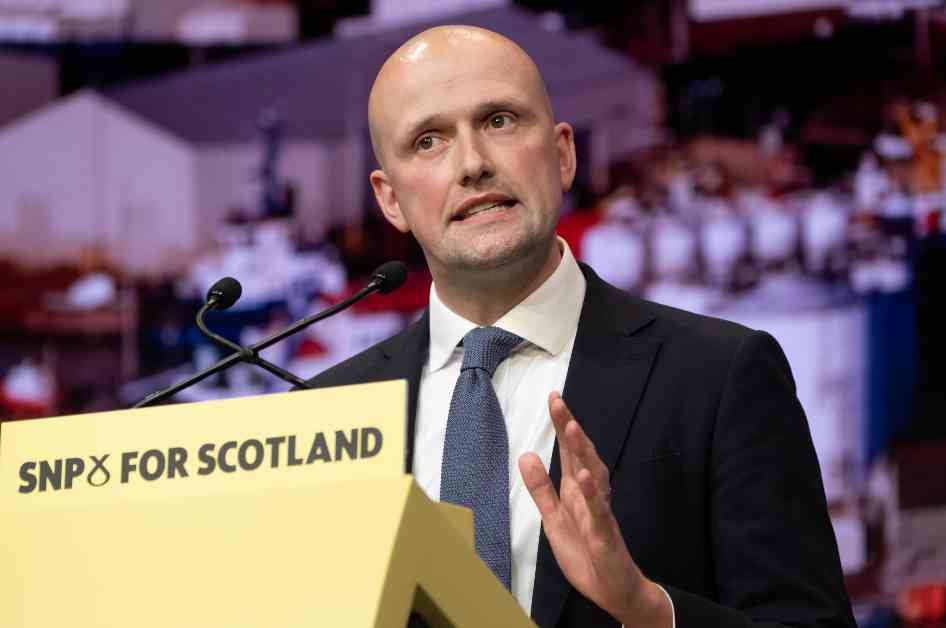Stephen Flynn, the Member of Parliament for Aberdeen South, has expressed openness to running for the leadership of the Scottish National Party (SNP) when a vacancy arises. While Flynn acknowledged his consideration for the top job, he emphasized his current support for John Swinney, who currently leads the party and the government. Speaking to Scottish journalists in the Commons, Flynn also mentioned the possibility of moving to Holyrood next year, indicating a potential shift in focus for his political career.
The Path to Leadership
As the first SNP MP to be re-elected in Aberdeen South, Flynn recognizes the significance of his position and the responsibility he holds towards his constituents. He highlighted the importance of fulfilling his duties to the people he represents, making it his current priority. Despite the speculation surrounding his potential leadership aspirations, Flynn remains committed to serving his constituents and focusing on his responsibilities as an MP before making any decisions about his political future.
Flynn’s Consideration for Holyrood
With the upcoming elections and the possibility of moving to Holyrood next year, Flynn is carefully weighing his options. He emphasized the need to consider his young family and constituents in making any decisions about his political career. By taking his time to evaluate the potential move to Holyrood, Flynn aims to make a reasoned judgment that benefits everyone involved. He emphasized the importance of thoughtful consideration in politics, indicating that rushing into decisions can have significant consequences.
The Future of the SNP
Flynn’s potential leadership candidacy has been a topic of discussion within the SNP, with Deputy First Minister Kate Forbes mentioned as his only rival. Despite the speculation, Flynn has not actively pursued leadership positions within the party, opting to focus on his current responsibilities. He emphasized the importance of confidence in one’s abilities and beliefs while also acknowledging the need for thoughtful consideration in pursuing leadership roles. Flynn’s approach to potential leadership opportunities reflects his commitment to making informed decisions that align with his values and priorities.
The Party’s Evolution
The SNP has undergone significant changes and challenges in recent years, including shifts in leadership and electoral outcomes. The party’s rules regarding dual mandates have presented obstacles for MPs considering a move to Holyrood, with the requirement to resign from their Westminster seat triggering a by-election. This rule, introduced in 2020, was perceived as a measure to prevent certain individuals, such as Joanna Cherry, from transitioning to the Scottish Parliament. However, following the party’s election results, there have been discussions about revisiting this rule to address the changing dynamics within the party.
Challenges and Opportunities
Despite the challenges faced by the SNP in recent elections, including a significant decrease in the number of MPs returned, polls indicate a tight race for Holyrood. The party’s performance in the upcoming elections will be crucial in shaping its future trajectory and leadership dynamics. As the political landscape evolves, SNP members like Flynn are considering their roles and potential contributions to the party’s growth and development. The upcoming elections present both challenges and opportunities for the SNP to reaffirm its position and priorities within the Scottish political landscape.
Support for John Swinney
Throughout his discussions about potential leadership roles and a move to Holyrood, Flynn has consistently expressed his support for John Swinney’s leadership of the party and the government. Acknowledging the importance of having strong leadership at the helm, Flynn emphasized his satisfaction with Swinney’s leadership and the direction of the party under his guidance. By highlighting his support for Swinney, Flynn underscores his commitment to working collaboratively within the party and respecting the current leadership structure.
Conclusion
As Stephen Flynn considers his future within the SNP and the potential for leadership roles, he remains focused on his responsibilities as an MP and the needs of his constituents. His thoughtful approach to decision-making and commitment to serving the people he represents reflect his dedication to public service. Whether he decides to pursue leadership roles or transition to Holyrood, Flynn’s priorities remain centered on making informed choices that benefit his constituents and the party as a whole. As the SNP navigates the complexities of the political landscape, individuals like Flynn play a crucial role in shaping the party’s future direction and ensuring its continued success.
































